
April 25, 2023
Publications

🌐follow Marie-Anne Frison-Roche on LinkedIn
🌐subscribe to the Newsletter MAFR Regulation, Compliance, Law
____
 ► Full Reference: M.-A. Frison-Roche, The role of the Judge in the deployment of Regulatory Law through Compliance Law, Working Paper, April 2023.
► Full Reference: M.-A. Frison-Roche, The role of the Judge in the deployment of Regulatory Law through Compliance Law, Working Paper, April 2023.
____
🎤 This working paper was drawn up to serve as the basis for the concluding summary session of the colloquium organised by the Conseil d'Etat (French Administrative Supreme Court) and the Cour de cassation (French Judicial Supreme Court), De la régulation à la compliance: quel rôle pour le juge? ("From Regulation to Compliance: what role for the Judge?") held on 2 June 2023 at the Conseil d'Etat.
____
📝 This working paper also served as the basis for the article that concludes the book De la régulation à la compliance : quel rôle pour le juge, published by the La Documentation Française, 2024.
____
► Working Paper Summary: It is remarkable to note the unity of conception and practice between professionals who tend to work in administrative jurisdictions and professionals who tend to work in judicial jurisdictions: they all note, in similar terms, an essential movement: what Regulatory Law is, how it has been transformed into Compliance Law, and how in one and even more so in the other the Judge is at the centre of it. Judges, as well as regulators and European officials, explain this and use different examples to illustrate the profound transformation this has brought about for the law and for the companies responsible for increasing the systemic effectiveness of the rules through the practice and dissemination of a culture of compliance. The role of the judge participating in this Ex Ante transformation is renewed, whether he is a public law judge or a private law judge, in a greater unity of the legal system.
____
🔓read the Working Paper below⤵️
April 17, 2023
Newsletter MAFR - Law, Compliance, Regulation

♾️ follow Marie-Anne Frison-Roche on LinkedIn
♾️ subscribe to the Newsletter MAFR Regulation, Compliance, Law
____
► Full Reference: M.-A. Frison-Roche, "Dans les causes systémiques : "délibérer" plutôt que "se disputer"" ("In systemic causes: 'deliberate' rather than 'argue'"), Newsletter MAFR - Law, Compliance, Regulation, 17 April 2023.
____
📧Read by freely subscribing other news of the Newsletter MAFR - Law, Compliance, Regulation
____
🔴To deal with "systemic causes", including systemic cases of compliance, move from "argument" to "deliberation" from the start
Compliance Law involves systems, for example banking, financial, digital, health, etc. When a dispute is brought before a judge, this dimension remains, whether before a judge of the Law or a judge of the merits, whether before a civil, criminal, commercial, administrative or European judge, etc. The judge's office must be adapted accordingly. And this is in the process of being done.
____
📧read the article ⤵️

April 12, 2023
Publications

April 4, 2023
Thesaurus : Doctrine
► Référence complète : A. Danis-Fatôme & N. Hoffschir, "La loi sur le devoir de vigilance rendue ineffective par le juge", Revue des sociétés, 2023, p.793.
____
🦉Cet article est accessible en texte intégral pour les personnes inscrites aux enseignements de la Professeure Marie-Anne Frison-Roche
________

March 20, 2023
Publications

♾️ follow Marie-Anne Frison-Roche on LinkedIn
♾️ subscribe to the Newsletter MAFR Regulation, Compliance, Law
____
► Full Reference: M.-A. Frison-Roche, Laws, Compliance, Contracts, and Judges: places and alliances, Working Paper, March 2023.
____.
📝this working paper is the basis for an article published in French (click HERE) in the 📚chronique of Compliance Law held in the Recueil Dalloz.
____
📚Read the other articles published by this Compliance Law Chronicle. open since 2018.
____
►Summary of this Working Paper: To understand the functioning of compliance systems in the articulation of the legal actors and the legal instruments used, whatever the technical sector considered, it is necessary to put the "law", the "contract" and the "judge" back into the perspective of legitimacy and efficiency regarding what Compliance is.
At the very least, it is a 'conformity' mechanism. In this process of simple obedience, legislators, economic operators, and judges find themselves in the position of having to obey the law in a hierarchical conception.
In a more dynamic and ambitious conception, when Compliance Law is not reduced to a more astute method of obedience but draws substantial normativity from the Monumental Goals pursued, legislators and operators enter an alliance. The contract becomes a major instrument, and the Judge becomes a major actor, no longer to punish the non-obedient but to facilitate the links to help a sustainable system.
Faced with issues such as digital, climatic, and technological challenges, where we are each so weak and isolated, we must not limit our conception and practices to the instrument of conformity but choose the substantial Compliance Law, i.e. the alliance of forces, which puts forward the contract and renews the office of the judge, with the Public Authorities remaining legitimate in setting the Monumental Goals since they commit the future of the social group.
________
🔓read bellow the developments⤵️
March 1, 2023
Interviews

♾️follow Marie-Anne Frison-Roche on LinkedIn
♾️subscribe to the Newsletter MAFR Regulation, Compliance, Law
____
► Full reference: M.-A. Frison-Roche, , F. Ancel, N. Roret, "Les juges vont être de plus en plus présents dans le droit de la compliance" ("Judges will be more and more involved in Compliance Law"), interview with Olivia Dufour, Actu-Juridique, 1st March 2023.
____
💬read the interview (in French)
____
► Presentation of the interview by the journal (in French) : "À l’instigation du professeur Marie-Anne Frison-Roche, l’École nationale de la magistrature (ENM) a proposé pour la première fois début février une formation en compliance à destination des magistrats et des avocats. François Ancel, conseiller la Cour de cassation, Nathalie Roret, avocate et directrice de l’ENM et Marie-Anne Frison-Roche plaident d’une seule voix pour le renforcement du rôle des acteurs judiciaires dans la compliance."
____
► Questions asked (in French):
- D’où est venue l’idée d’aborder ce droit en cours d’émergence qui semble encore très confidentiel ?
- En effet, on croit souvent savoir ce qu’est la compliance, en la confondant avec la conformité, pouvez-vous expliquer ce qui les distingue ?
- On constate, en lisant le programme de la formation, que toutes les branches du droit sont concernées par la compliance depuis le droit des sociétés jusqu’au pénal en passant par les contrats et la responsabilité. Pouvez-vous nous donner des exemples ?
- Comment se redistribuent les rôles entre les avocats, les juges et les entreprises dans cette nouvelle configuration qu’est la compliance ?
- En quoi est-ce important pour les magistrats d’appréhender ce nouvel univers ?
- Ces transformations sont-elles cantonnées à la compliance ou peuvent-elles sortir de son champ ?
- Par exemple qu’en est-il de la question très controversée du rôle de l’avocat à l’égard du juge ?
- Avez-vous constaté lors de cette formation une amélioration du dialogue entre les différents acteurs ?
- Cette formation va-t-elle être instituée de manière permanente dans la formation des magistrats et des avocats ? Une autre manifestation est-elle prévue ?
________
Feb. 2, 2023
Editorial responsibilities : Direction of the collection "Regulations & Compliance", JoRC & Dalloz
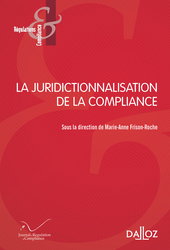
🌐follow Marie-Anne Frison-Roche on LinkedIn
🌐subscribe to the Newsletter MAFR Regulation, Compliance, Law
🌐subscribe to the Video Newsletter MAFR Surplomb
____
► Full Reference: M.-A. Frison-Roche (ed.), La juridictionnalisation de la Compliance, série "Régulations & Compliance", Journal of Regulation & Compliance (JoRC) and Dalloz, 2023, 490 p.
____
► This book in few words: Sanctions, controls, appeals, deals: judges and lawyers are everywhere in the Compliance mechanisms, creating unprecedented situations, sometimes without a solution yet available. Even though Compliance was designed to avoid the judge and produce security by avoiding conflict. This jurisdictionalisation is therefore new. Forcing companies to prosecute and judge, a constrained role, perhaps against their nature. Leading to the adaptation of major procedural principles, with difficulty. Confronting arbitration with new perspectives. Putting the judge at heart, in mechanisms designed so that he is not there. How in practice to organize these opposites and anticipate the solutions? This is the challenge taken up by this book.
____
📘 In parallel, the English version of this book, Compliance Jurisdictionalisation, is published in the series co-published by the Journal of Regulation & Compliance (JoRC) and Bruylant.
____
📅 This book comes after a cycle of colloquia organised in 2021 by the Journal of Regulation & Compliance (JoRC) and its Academic Partners.
____
This volume is the continuation of the books dedicated to Compliance in this collection.
► Read the presentations of the other books on Compliance in this collection:
- further books:
🕴️M.A. Frison-Roche (ed.), 📕Le système probatoire de la compliance, 2025
🕴️M.A. Frison-Roche (ed.), 📕L'obligation de compliance, 2024
🕴️M.A. Frison-Roche et M. Boissavy (ed.), 📕Compliance & droits de la défense. Enquête interne - CJIP - CRPC, 2023
- previous books :
🕴️Frison-Roche, M.-A. (ed.), 📕 Les buts monumentaux de la Compliance, 2022
🕴️Frison-Roche, M.-A. (ed.), 📕 Les outils de la Compliance, 2020
🕴️Frison-Roche, M.-A. (ed.), 📕 Pour une Europe de la Compliance, 2019
🕴️N. Borga, N., 🕴️J.-Cl. Marin & 🕴️J.-Ch. Roda (ed.), 📕 Compliance : Entreprise, Régulateur, Juge, 2018
🕴️Frison-Roche, M.-A. (ed.), 📕 Régulation, Supervision, Compliance, 2017
🕴️Frison-Roche, M.-A. (ed.), 📕 Internet, espace d'interrégulation, 2016
📕 Read the presentations of the other titles of the collection.
____
► General presentation of the book: There have always been Judges and Lawyers in Compliance Law, because this branch of Law is an extension of Regulatory Law in which they have a core place. This results from the fact that the decisions taken in respect of Compliance are contestable in Court, including Arbitration, those issued by the Company, such as those of States or Authorities, the Judge in turn becoming what Compliance Law is effective.
The novelty lies more in the phenomenon of "jurisdictionalisation", that is the trial model penetrates all Compliance Law, and not only the Ex-Post part that it includes. Moreover, it seems that this jurisdictionalisation influences the non-legal dimension of Compliance. This movement has effects that must be measured and causes that must be understood. Advantages and disadvantages that must be balanced. If only to form an opinion vis-à-vis Companies that have become Prosecutors and Judges of themselves and others ...: encourage this "Jurisdictionalisation of Compliance", fight it, perhaps influence it? In any case, understand it!
___
🏗️ General construction of this book:
The book begins by a double Introduction, the first (in free access) summarizing the book, the second, substantial, relating to the need to reinforce the Judge and the Lawyer to impose the Compliance Law as a characteristic of the Rule of Law.
The first Part is devoted to what is specific to Compliance Law. of Compliance: the transformation of companies into Prosecutors and Judges of themselves, even of others.
The second Part relates to Compliance general procedural Law, the procedure being the way between the dispute and the judgement.
The third Part continues this journey to the judge and aims to measure the influence of the reasoning and requirements of Compliance Law in dispute resolution methods where it was not, with some exceptions, present, but where it has a great future: Arbitration.
Because trial and judicial decision are inseparable, because legal techniques and the Rule of Law should not be divided but compliance techniques could paradoxically be the weapon of their dissociation, because the power to judge and the procedures surrounding the latter must not be dissociated, because therefore Compliance mechanisms and the Rule of Law must be thought out and practiced then, the rise in power of one must be the sign of the rise in power of the other, and not the price of the 'weakening of the Rule of Law, the fourth Part relates to the Judges in the Compliance mechanisms and culture.
____
DOUBLE INTRODUCTION
🕴️M.-A. Frison-Roche, 📝Lignes de force de l'ouvrage La juridictionnalisation de la Compliance free access to the full text
🕴️M.A. Frison-Roche, 📝Conforter le rôle du Juge et de l'Avocat pour imposer la Compliance comme caractéristique de l'État de Droit
I. L'ENTREPRISE INSTITUÉE PROCUREUR ET JUGE D'ELLE-MEME ET D'AUTRUI PAR LE DROIT DE LA COMPLIANCE ("THE COMPANY ESTABLISHED PROSECUTOR AND JUDGE OF ITSELF AND OTHERS BY COMPLIANCE LAW")
🕴️M.-A. Frison-Roche,📝 Le "jugeant-jugé". Articuler les mots et les choses face à l'éprouvant conflit d'intérêts
🕴️C. Granier, 📝Réflexions sur l'existence d'une jurisprudence des entreprises
🕴️L.-M. Augagneur, 📝La juridictionnalisation de la réputation par les plateformes
🕴️A. Bruneau, 📝L'entreprise juge d'elle-même : la fonction compliance dans la banque
🕴️Lapp, Ch., 📝La compliance dans l'entreprise : les statuts du process
🕴️J. Heymann, 📝La nature juridique de la "Cour suprême" de Facebook
🕴️D. Latour, 📝Les enquêtes internes au sein des entreprises
🕴️A. Bavitot, 📝Le façonnage de l'entreprise par les accords de justice pénale négociée
🕴️S. Merabet, 📝La vigilance, être juge et ne pas juger
II. LE DROIT PROCESSUEL À L'OEUVRE DANS LE DROIT DE LA COMPLIANCE ("GENERAL PROCEDURAL LAW IN COMPLIANCE LAW")
🕴️N. Cayrol, 📝Des principes processuels en Droit de la Compliance
🕴️F. Ancel,📝Le principe processuel de compliance, un nouveau principe directeur du procès ?
🕴️B. Sillaman, 📝Secret professionnel et coopération : les leçons de procédure tirées de l’expérience américaine pour une application universelle
🕴️S. Scemla,🕴️D. Paillot, 📝La difficile appréhension des droits de la défense par les autorités de contrôle en matière de compliance
🕴️M.-A. Frison-Roche, 📝Ajuster par la nature des choses du Droit processuel au Droit de la Compliance
III. L'ARTICULATION DE LA COMPLIANCE ET DE L'ARBITRAGE INTERNATIONAL ("ARTICULATION BETWEEN COMPLIANCE LAW AND INTERNATIONAL ARBITRATION")
🕴️J.-B. Racine, 📝Compliance et Arbitrage. Essai de problématisation
🕴️E. Silva-Romero,🕴️R. Legru, 📝Quelle place pour la Compliance dans l'arbitrage d'investissement ?
🕴️C. Kessedjian, 📝L'arbitrage au service de la lutte contre la violation des droits de la personne humaine par les entreprises
🕴️M. Audit, 📝La position de l'arbitre en matière de compliance
🕴️J. Jourdan-Marques, 📝L’arbitre, juge ex ante de la compliance ?
🕴️E. Kleiman, 📝Les objectifs de la compliance confrontés aux acteurs de l’arbitrage
🕴️F.-X. Train, 📝Arbitrage et procédure parallèles exercées au titre de la compliance
🕴️Cl. Debourg, 📝La compliance au stade du contrôle des sentences arbitrales
IV. LE JUGE DANS LE DROIT DE LA COMPLIANCE ("THE JUDGE IN COMPLIANCE LAW")
🕴️M.-A. Frison-Roche, 📝Le juge, l'obligation de compliance et l'entreprise. Le système probatoire de la Compliance
🕴️J. Morel-Maroger, 📝La réception des normes de la compliance par les juges de l'Union européenne
🕴️S. Schiller, 📝Un juge unique en cas de manquement international à des obligations de compliance ?
🕴️O. Douvreleur, 📝Compliance et juge du droit
🕴️F. Raynaud, 📝Le juge administratif et la compliance
🕴️E. Wennerström, 📝Quelques réflexions sur la Compliance et la Cour européenne des droits de l'Homme
________
Feb. 2, 2023
Publications

♾️ follow Marie-Anne Frison-Roche on LinkedIn
♾️ subscribe to the Newsletter MAFR Regulation, Compliance, Law
____
► Full Reference: M.-A. Frison-Roche, "Conforter le rôle du Juge et de l'Avocat pour imposer la Compliance comme caractéristique de l'État de Droit" ("Reinforce the Judge and the Attorney to impose Compliance Law as a characteristic of the Rule of Law"), in M.-A. Frison-Roche (dir.), La juridictionnalisation de la Compliance, coll. "Régulations & Compliance", Journal of Regulation & Compliance (JoRC) and Dalloz, 2023, p. 29-55.
____
► This article is the introduction of the book.
____
📝read the article (in French)
____
🚧read the bilingual Working Paper which is the basis of this article, with additional developments, technical references and hyperlinks
____
📕read a general presentation of the book, La juridictionnalisation de la Compliance, in which this article is published
____
► Summary of the article (done by the Journal of Regulation & Compliance): One can understand that the compliance mechanisms are presented with hostility because they seem designed to keep the judge away, whereas there is no Rule of Law without a judge. Solid arguments present compliance techniques as converging towards the uselessness of the judge (I). Certainly, we come across magistrates, and of all kinds, and powerful ones, but that would be a sign of imperfection: its ex-ante logic has been deployed in all its effectiveness, the judge would no longer be required... And the lawyer would disappear so with him...
This perspective of a world without a judge, without a lawyer and ultimately without Law, where algorithms could organize through multiple processes in Ex Ante the obedience of everyone, the "conformity" of all our behaviors with all the regulatory mass that is applicable to us, supposes that this new branch of Law would be defined as the concentration of processes which gives full effectiveness to all the rules, regardless of their content. But supposing that this engineer's dream is even achievable, it is not possible in a democratic and free world to do without judges and lawyers.
Therefore, it is imperative to recognize their contributions to Compliance Law, related and invaluable contributions (II).
First of all, because a pure Ex Ante never existed and even in the time of the Chinese legists, people were still needed to interpret the regulations because a legal order must always be interpreted Ex Post by who must in any case answer the questions posed by the subjects of law, as soon as the political system admits to attributing to them the right to make claims before the Judge. Secondly the Attorney, whose office, although articulated with the Judge's office, is distinct from the latter, both more restricted and broader since he must appear in all cases where the judicial figure puts himself in square, outside the courts. However, Compliance Law has multiplied this since not only, extending Regulatory Law, it entrusts numerous powers to the administrative authorities, but it also transforms companies into judges, in respect of which the attorneys must deal with.
Even more so, Compliance Law only takes its sense from its Monumental Goals. It is in this that this branch of the Law preserves the freedom of human beings, in the digital space where the techniques of compliance protect them from the power of companies by the way that the Compliance Law forces these companies to use their power to protect people. However, firstly, it is the Judges who, in their diversity, impose as a reference the protection of human beings, either as a limit to the power of compliance tools or as their very purpose. Secondly, the Attorney, again distinguishing himself from the Judge, if necessary, reminds us that all the parties whose interests are involved must be taken into consideration. In an ever more flexible, soft, and dialogical Law, everyone presenting himself as the "advocate" of such and such a monumental goal: the Attorney is legitimate to be the first to occupy this place.
________
May 9, 2022
Publications

► Référence complète : Frison-Roche, M.-A., Notes prises pour la synthèse sur le vif de la conférence L'office du juge et les causes systémiques, in Cycle de conférences, Penser l'office du juge, Grand Chambre de la Cour de cassation, 9 mai 2022, 17h-19h.
____
► Résumé des notes prises au fur et à mesure de la conférence : les trois juges, Christophe Soulard, Président de la Chambre criminelle de la Cour de cassation, Fabien Raynaud, Conseiller d'Etat, et François Ancel, Président de la Chambre internationale de la Cour d'appel de Paris, invités à réfléchir et réagir à une hypothèse, à savoir l'existence parmi les cas qui leur sont apportés par les parties, sont intervenus à la fois d'une façon très diverse, très originale et exprimant pourtant l'unicité de l'art de juger.
Les notes prises ci-dessous montrent que les juges ont conscience que les temps ont changé et que, de plus en plus, les "systèmes" sont présents dans les causes qui, construites par les parties, leur sont présentées (1). Leurs analyses, réactions et propositions ont montré à ceux qui les écoutaient que pour appréhender des causes systémiques, les juges doivent être expérimentés (2). Ils ont eu souci de fixer des critères pour identifier la nature systémique des causes parmi la multitude de celles qu'ils traitent, justifiant alors un traitement procédural et décisionnaire particulier (3). L'auditoire a ainsi pu mesurer la part qui revient aux parties (4), puisque le système est dans la construction des faits de la cause et la part qui revient à l'office du juge (5).
Il apparaît alors que par un effet de miroir, l'office du juge se déplace de l'Ex Post vers l'Ex Ante (6), les trois juges décrivant et proposant des mécanismes concrets pour appréhender en Ex Ante cette dimension systémique et y répondre (7). Ils soulignent que cela s'opère en collaboration avec les avocats, dans une instruction élargie et le débat contradictoire (8), dans une collaboration qui s'opère en amont (9). Les trois magistrats ont recherché les techniques procédurales pour accroître la plus grande considération des systèmes (10) et les nouvelles organisations à mettre en place pour répondre à cette dimension systémique de certaines causes (11). Pour ce faire, une dialectique est à opérer vers, à la fois, de l'informel mais aussi plus de formel (12), l'ensemble produisant une meilleure réception méthodologique des systèmes par les juges (13) par une plus grande compréhension entre les juges, quel que soit leur niveau et les droits substantiels en cause, les autorités et les parties systémiques (14).
____
🎥Voir la vidéo de l'ensemble de la conférence
🎥 Voir la vidéo de la synthèse réalisée sur le vif par Marie-Anne Frison-Roche au terme de la conférence
____
📝Lire l'article de Marie-Anne Frison-Roche rendant compte au Dalloz de la conférence.
____
🚧 lire le document de travail L'hypothèse de la "cause systémique, réalisé préalablement à la conférence, pour préparer celle-ci.
_____
✏️ lire les notes exhaustives prises pendant la conférence⤵️

Updated: April 4, 2022 (Initial publication: Oct. 4, 2021)
Publications

🌐follow Marie-Anne Frison-Roche on LinkedIn
🌐subscribe to the Newsletter MAFR. Regulation, Compliance, Law
____
► Full Reference: M.-A. Frison-Roche, The Hypothesis of the category of Systemic Cases brought before the Judge, Working Paper, October 2021 and April 2022.
____
► This working paper has served as the basis for an introductory speech 🎤L'hypothèse de la catégorie des causes systémiques (The Hypothesis of the cateory of Systemic Cases), in a more general conference which I coordinated and moderated, 🧱L'office du juge et les causes systémiques, which is part of a general cycle covering Penser l'office du juge, specific conference attending the 9th May 2002 into the Grand Chamber of the Cour de cassation.
This Working Paper was drawn up in October 2021 to build the conference on the assumption that among the diversity of "cases" brought to the courts by litigants, some constitute a specific category: "systemic cases", justifying treatment that is both specific (in that they are systemic, calling in particular for procedural solutions common to all and distinguishable from the treatment of non-systemic cases) and common treatment beyond the diversity of judges who deal with them (judicial and administrative judges, criminal and non-criminal judges, French and non-French judges, judges of the member-States legal orders and European Union judges, etc.).
This working paper does not aim to deal with the whole subject, i.e. both to determine this category of "systemic causes" and the consequences that must be drawn from it for the judge's office, since that is the very purpose of the conference, which is built around several presentations: it aims to deal with the first part of the subject, i.e. the very existence of this new processual category, which is "systemic causes", leaving for other work the practical consequences to be drawn from it in the processual treatment that it calls for.
____
📝This Working Paper is also the basis of a forthcoming article
____
► Summary of the Working Paper: xx
________
Read below the developments⤵️
Jan. 31, 2022
Thesaurus : Doctrine
► Référence complète : Hoynck, S., Le juge administratif et le dérèglement climatique. Libres propos, AJDA, 2022, p.147 et s.
____
► Résumé de l'article par l'auteur : C'est essentiellement depuis la signature de l'accord de Paris que les juges - pas seulement en France - ont été invités par diverses requêtes à prendre leur part dans la lutte contre le dérèglement climatique. Le risque de tels contentieux est qu'ils n'aient qu'une dimension incantatoire, qu'ils ne permettent que de décerner des bons ou des mauvais points à la politique climatique d'un gouvernement, ce qui n'est pas la conception que le juge administratif français se fait de son office. Si de tels contentieux ne sauraient à l'évidence constituer la solution unique à la crise climatique, le juge a bien son rôle à jouer.

Dec. 24, 2021
Publications

🌐 follow Marie-Anne Frison-Roche on LinkedIn
🌐subscribe to the Newsletter MAFR Regulation, Compliance, Law
____
 ► Full reference: M.-A. Frison-Roche, Conceiving Power, Working Paper, December 2021
► Full reference: M.-A. Frison-Roche, Conceiving Power, Working Paper, December 2021
____
📝 This Working Paper serves as the basis for an article to be published in the collective book drawn up in tribute to Professor Emmanuel Gaillard.
____
► Working Paper summary: In 1985, Emmanuel Gaillard's central work came out under the title Le pouvoir en droit privé (The Power in Private Law)📎
Let's give full force to the original title of the thesis.
The deletion of the term notion perhaps implies that by defining something the essential is done, that there would be something of a pleonasm in aiming at The notion of Power and The Power, as Law likes to economise on words.
But it was indeed a renewed, simpler and more powerful conception of the notion of Power, containing the entire regime necessarily imputed, that this work imposed, henceforth illuminating positive Law. Emmanuel Gaillard's definition, on the other hand, goes beyond Private Law. We would gladly have argued in favour of retaining the heading for the term Notion, proposing instead to dispense with the reference to Private Law alone ....
Perhaps it was because the concept is so vast that in this seminal thesis its scope was restricted to Private Law, since the author already had to account for the sheer multiplicity of manifestations in this part of the legal system; Or perhaps it was because the concept of 'Power' is so familiar in Public Law that it would have needed less definition in Public Law (which, moreover, is so diversely proposed in this more political area, which is already careful on principle to distinguish between powers, which must always be plural in order to be separated), and that it was therefore reasonable to want to arrive at a single concept of Power in Private Law, where the notion of subjective rights is more familiar.
However, Emmanuel Gaillard's definition of Power as a prerogative placed, by legal rule or contract, in the hands of the person invested with them for the benefit, at least in part, of others, covers both Public and Private Law. This even contributes to the solidity of this thesis and explains why it flourishes today in legal systems where the distinction between Private Law and Public Law is weakening.
The power of this definition lies in its simplicity. Simple and brave minds are often the most fruitful. As Dean Gérard Cornu points out in his preface, the author, in particular because he bases himself more on positive law, for example that relating to the powers of corporate officers, does not get bogged down in discussions between authors only to end up preferring one over the other. He arrives at a definition that is close to our everyday experience: the one we experience when we collect an envelope on behalf of someone else and the agent asks us in what capacity we claim to be doing this on his behalf. We then show him our 'power', the legal power to do so for the benefit of the person to whom the letter is addressed, and can thus exercise the power to withdraw the letter, even though it is personal. When legal and common sense come together, it is a good omen, not only in terms of form, because everyone can understand it and the Law must remain comprehensible, but also in terms of substance, because everyone must be able to control the exercise of a power that is exercised for and over others. For this letter addressed to someone else, the person who has been able to take it by virtue of the power conferred on him/her, could just as easily open it and read it, then destroy it or give it to the worst enemy of the person to whom it was addressed. In Power, there is always might to do, and the danger to others that Power contains therefore.
This highly legal definition of Power not only distances the holder from his/her own interests, but also channels the Power thus granted to the person who benefits from it. In this respect, Emmanuel Gaillard not only distinguished between Power and subjective right, but also identified the right amount of power required for this power to effectively fulfill this 'Mission', through the notion of abuse of power, when the holder uses for other beneficiaries this power that was conferred on him/her for this sole purpose.
What is more, this concept makes it possible to distinguish Power from discretionary force, because the holder of Power thereby exercises factual , by acting for others, deciding for others, deciding on others. Because Power is inseparable from might, but might must remain the means of power and no more, the Law shall produce the antibodies that are not only the theory of abuse of power but also an Ex Ante responsibility that accounts must always be rendered, either to the other for whom everything is done or to a third party. For this third party is often there from the outset, the guardianship judge for example: because the Power was put in place because of the beneficiary's weakness, both in himself/herself and because of the situation, an impartial and disinterested third party is needed to ensure proper execution from the outset, without there even being a dispute. In this respect, how useful this thesis is for thinking about what Supervision is today!
This thesis, so clear, so simple and so strong, goes beyond Private or Civil Law. It is both much more restrictive than the more factual and political definition of Oower, which would be the ability to do something, and much broader than the usual definitions, since it embraces and legitimises de jure all situations where a person acts legally for the benefit of another. Dean Cornu shows, moreover, in two sentences that such a notion of power also captures the office of the judge, who has power over others only to serve them 📎
Moreover, Power thus contains its own limit in its very definition, since others are present in it: the holder has power only to serve others. From then on, it is only a power because it is a kind of Charge. Emmanuel Gaillard immediately uses the term: "Un individu se voit confier une charge qu'il exerce dans un intérêt au moins partiellement distinct du sien propre" ("An individual is entrusted with an office which he exercises in an interest at least partially distinct from his own") 📎
This definition offered by Emmanuel Gaillard in 1981, anchored in Private Law only insofar as it is the entire legal system, is premonitory of the Regulatory and Compliance Law as it unfolds today. It would be enough to continue the Gaillard's sentences, as if they had been half-written, to finish them 40 years later and find in them the mechanisms of Supervision of companies by public authorities which are now in place not to reduce their power but to ensure that they exercise it for the benefit of others 📎
The definition of Power thus conceived contains within itself its regime and enables us to anticipate it better today: because the holder exercises Power only for others, at least partially, he is consubstantially accountable for it, responsibility being only one form of this accountability; because this service must be effective and others must benefit fully from it, because unlike the subjective right which allows the holder freely not to use his might, Power has never been the 'most absolute' availability to use his/her might: it is even the opposite. It is the expression of a Power assigned to a purpose, compelling the holder to use his/her Power to that end. But it is equally necessary for the holder to have all the might to do so, otherwise the very notion of 'Power' is meaningless. This is the definition that should be given to the principle of Proportionality: the person on whom the Power rests must have not more power than is necessary, but all the power necessary to achieve the Monumental Goals for which the Power has been entrusted to him/her, so that others may derive full benefit from it (II).
In today's positive Law, the definition of Power as a Duty is found not only in Private Law but also in Public Law, not least because pure might, i.e. those that do not account for the use of their might, are in decline while concern for others is on the increase. The days of discretionary powers are over, and the increased independence of those who exercise Power over others requires them to be accountable. Beyond this Accountability, the personal Responsibility of those who have the Power to serve others is being established. But, no doubt because the Law is slow to evolve, the correlative idea that the holder of Power must have all the powers required to carry out his/her mission is less entrenched: As Emmanuel Gaillard has shown, the Law has only gone part of the way in sanctioning excesses of power, when the holder uses his/her power for other goals, but it has not yet clearly established that the holder - sometimes forced - of a Power is legitimate in using all the means required to achieve the result for which this Power, i.e. a charge and a duty, has been conferred on him/her.
No doubt we need to read Emmanuel Gaillard's thesis again in all its potential, to imagine the reading we could do today of what he could have written as if on blank pages that would write themselves, a magical thesis where everything is already there, a thesis so short (250 pages) and so beautiful, so dense that it already contains the Law of the Future. The Law of the Future 📎
____
Lire les développement ci-dessous⤵
Gaillard, E., Le pouvoir en droit privé, préf. Cornu. G., coll. ..., Economica, 1985.
Gaillard, E., La notion de pouvoir en droit privé, thèse .... ;
"En droit processuel, l'office du juge aurait donné à l'auteur un renfort. Pour le juge, il n'est point de pouvoir sans devoir. Au-delà de la distinction de ce qu'il a obligation de faire ou faculté d'apprécier, il y a toujours, au creux de ce qu'il peut, le sceau de ce qu'il doit, un devoir gardien - comme un âme - de l'exercice du pouvoir." (p.5).
n°3, p.9.
🕴️J. Carbonnier, 📗Essai sur les lois, 1992 (on the guardianship).
S. in a general way, 🕴️M.-A. Frison-Roche (ed.), 📕Régulation, Supervision, Compliance, 2017.
Cornu, préface précitée : "Tous les pouvoirs sont, à double face, des pouvoirs-devoirs" (p.5).
On Compliance Law as a Law of the Future, s. 🕴️M.-A. Frison-Roche, 📝Compliance Monumental Goals, beating heart of Compliance Law, in 🕴️M.-A. Frison-Roche (ed.), 📘Compliance Monumental Goals, 2023.
On the consequences for Liability Law, which is now looking to the Future, s. 🕴️M.-A. Frison-Roche, 🚧Ex Ante Responsibility, 2021.
Sur la notion de "Responsabilité Ex Ante", v. Frison-Roche, M.-A., La responsabilité Ex Ante", in Archives de Philosophie du Droit, La responsabilité, 2022.

Aug. 16, 2021
Publications

 ► Full Reference: Frison-Roche, M.-A, Reinforce the judge and the lawyer to impose Compliance Law as a characteristic of the Rule of Law, Working Paper, August 2021.
► Full Reference: Frison-Roche, M.-A, Reinforce the judge and the lawyer to impose Compliance Law as a characteristic of the Rule of Law, Working Paper, August 2021.
____
🎤 this working document has been made to prepare some elements of the opening intervention in the symposium Quels juges pour la Compliance) ? (Which judges for Compliance?), co-organized by the Journal of Regulation & Compliance and the Institut Droit Dauphine, held at the Paris Dauphine University on September 23, 2021, constituting the first part of the intervention.
____
📝it has been also the basis for an article:
📕 published in its French version in the book La juridictionnalisation de la Compliance, in the collection📚Régulations & Compliance
📘published in its English version in the book Compliance Jurisdictionalisation, in the collection 📚Compliance & Regulation
____
► Summary of the Working Paper: One can understand that the compliance mechanisms are presented with hostility because they seem designed to keep the judge away, whereas there is no Rule of Law without a judge. Solid arguments present compliance techniques as converging towards the uselessness of the judge (I). Certainly, we come across magistrates, and of all kinds, and powerful ones, but that would be a sign of imperfection: its ex-ante logic has been deployed in all its effectiveness, the judge would no longer be required... And the lawyer would disappear so with him...
This perspective of a world without a judge, without a lawyer and ultimately without Law, where algorithms could organize through multiple processes in Ex Ante the obedience of everyone, the "conformity" of all our behaviors with all the regulatory mass that is applicable to us, supposes that this new branch of Law would be defined as the concentration of processes which gives full effectiveness to all the rules, regardless of their content. But supposing that this engineer's dream is even achievable, it is not possible in a democratic and free world to do without judges and lawyers.
Therefore, it is imperative to recognize their contributions to Compliance Law, related and invaluable contributions (II).
First of all, because a pure Ex Ante never existed and even in the time of the Chinese legists📎
Even more so, Compliance Law only takes its sense from its Monumental Goals📎
____
🔓read the Working Paper developments below⤵️
L’empire chinois n’a semble-t-il jamais apprécié les juges, ne leur faisant place que sous la forme de serviteurs purs de l’Etat, qu’ils soient des enquêteurs, des punisseurs et de gardiens de l’ordre public. Sur cet aspect du Droit chinois, v. … ; sur cette période particulièrement sanglante des légistes, où le principe de « certitude » de la législation a été portée à ses nues, v. …
🕴️Frison-Roche, M.-A. (ed.), 📘Compliance Monumental Goals, 2022.
The topic of this study is general. For a more analytical perspective, s.. 🕴️Frison-Roche, M.-A., « The function of the Judge in Compliance Law », in 🕴️Frison-Roche, M.A. (ed.), 📘Compliance Jurisdictionalisation, 2023.
🕴️Frison-Roche, M.-A. (ed.), 📘Compliance Tools, 2021.
July 7, 2021
Thesaurus : Soft Law
Référence complète : Cour de cassation, Rapport de la Commission de réflexion sur la Cour de cassation 2030, juillet 2021.
_____
March 31, 2021
Conferences

 Full reference: Frison-Roche, M.-A., Compliance et arbitrage. Rapport de synthèse: un adossement (Compliance and Arbitration: a Backing. Conclusion), in Frison-Roche, M.-A. & Racine, J.-B., Compliance et Arbitrage (Compliance and Arbitration), Colloquium co-organised by the Journal of Regulation & Compliance (JoRC) and the Centre de recherches sur la Justice et le Règlement des Conflits (CRJ) of Panthéon-Assas University (Paris II), with the support avec the International Court of Arbitration, Paris, 31st of March 2021
Full reference: Frison-Roche, M.-A., Compliance et arbitrage. Rapport de synthèse: un adossement (Compliance and Arbitration: a Backing. Conclusion), in Frison-Roche, M.-A. & Racine, J.-B., Compliance et Arbitrage (Compliance and Arbitration), Colloquium co-organised by the Journal of Regulation & Compliance (JoRC) and the Centre de recherches sur la Justice et le Règlement des Conflits (CRJ) of Panthéon-Assas University (Paris II), with the support avec the International Court of Arbitration, Paris, 31st of March 2021
_____
Read the program of this colloquium
See Marie-Anne Frison-Roche's conclusion in video (in French, with English subtitles)
These notes of the conclusion have been written as the colloquium took place.
See the video of the entire colloquium (in French, with English subtitles)
___
This colloquium is part of the Cycle of colloquium 2021 organized by the Journal of Regulation & Compliance (JoRC) and its partners around the topic Compliance Juridictionnalization.
This manifestation is in French but the interventions will be the basis for a specific chapter of the English collective book directed by Marie-Anne Frison-Roche, Compliance Juridictionnalization, co-published by the JoRC and Bruylant.
An equivalent book in French, La Juridictionnalisation de la Compliance, directed by Marie-Anne Frison-Roche, will be co-published by the JoRC and Dalloz.
Read the notes established for the conclusion below ⤵️
April 4, 2018
Thesaurus : Doctrine

► Référence complète : L. Miniato et J. Théron (dir.), Pierre Hébraud, doctrine vivante ?, Presses Universitaires de Toulouse - LGDJ, 2018, 231 p.
____
____
► Présentation de l'ouvrage (faite par l'éditeur) : "Cet ouvrage consacré à Pierre Hébraud se propose d’étudier sa doctrine, lui qui fut notamment un éminent processualiste. L’occasion en est donnée avec les 80 ans de sa nomination comme professeur à Toulouse (1937) et les 30 ans de l’inauguration de l’amphithéâtre à son nom (1987). Pourtant, mais peut-être cela résulte-t-il de sa personnalité décrite comme discrète, son œuvre ne reste connue que des spécialistes, sans que jamais ne fût posée la question de déterminer s’il existe une doctrine propre à Pierre Hébraud, sans jamais que ne fût clamée une école de Pierre Hébraud. La doctrine de Pierre Hébraud, créatrice sinon révélatrice, a influencé la doctrine dans son ensemble et le droit positif sur un grand nombre de points : autorité de chose jugée, acte juridictionnel, classification des actions, rôle de la Cour de cassation, arbitrage… Juriste extrêmement ouvert, attiré par le droit comparé, il est même suspecté être à l’origine de la notion de droit processuel. Analyser les travaux de Hébraud en droit processuel et procédure civile nécessite évidemment de replacer ses écrits dans leur contexte. Mais il s’agit également et surtout de souligner qu’ils sont marqués d’une grande modernité et sont parfaitement aptes à décrire le droit contemporain et peut être même à régler des scories jusqu’ici irrésolues. La question posée au long de cette journée d’échanges est alors simple : sa doctrine est-elle toujours vivante ?".
____
► Sommaire de l'ouvrage :
Julien Théron, Avant-propos
Jean-Christophe Gaven, Pierre Hébraud, l’itinéraire universitaire
Première partie : La matière procédurale dans la doctrine de Pierre Hébraud
Chapitre 1 : Aspects fondamentaux
Emmanuel Jeuland, Hébraud, la notion de droit processuel dans la perspective de la justice numérique
Lycette Corbion-Condé, Pierre Hébraud et le droit international privé : une doctrine vivante ?
Chapitre 2 : Procédures spéciales
Thomas Clay, Pierre Hébraud et l’arbitrage
Olivier Staes, La juridiction du provisoire
Didier Cholet, Pierre Hébraud et la réforme de la Cour de cassation
Deuxième partie : Le juridictionnel dans la doctrine de Pierre Hébraud
Chapitre 1 : Le litige
Nicolas Cayrol, La liaison du contentieux
Lionel Miniato, La fonction juridictionnelle
Chapitre 2 : La portée
Philippe Théry, Pierre Hébraud : une analyse réaliste de la jurisprudence
Observations conclusives
Loïc Cadiet, Pierre Hébraud, doctrine vivante ?
Nov. 15, 2017
Thesaurus : Doctrine
► Référence complète : Le Gac-Pech, S., Le nouvel art de juger : quand la proportionnalité s'invite dans la mise en œuvre de la règle de droit, Revue Lamy Droit civil, nº 153, 2017.
July 19, 2017
Blog

Quand on avance dans l'église San Carlo de la ville de Noto en Sicile, avant d'arriver à l'autel un espace circulaire vide permet au croyant qui se place au centre du dallage en marbre blanc de lever les yeux. Ceux qui ont conçu cet espace songeaient aux croyants qui aspirant au ciel lèvent naturellement la tête. Les touristes dont la préoccupation principale est l'accumulation de data dans leurs téléphones le font moins.
Désormais les japonais ne sont plus objets de moqueries, les marchands de cartes postales ne font plus recettes, les croyants ont disparu. Mais les statues restent là, dans ce cercle ouvert avant l'autel, devant lequel nul ne s'agenouille. Si un croyant passait encore, s'il allait jusqu'à l'autel, s'il levait les yeux, il serait sous les quatre regards de quatre femmes drapées.
Elles expriment ce que l’Église veut inculquer, les statuaires comme les peintures étant autant de livres d'écoliers. Mais le drapé qui revêt les quatre jeunes femmes au physique de Diane fait davantage penser à une représentation que l'âge classique donne de la beauté grecque qu'à une modestie biblique. L'aigle qui accompagne l'une d'elle suffit à montrer que la doctrine pieuse a été pénétrée d'une autre pensée. Il n'est pas même besoin de lire la mention des quatre vertus cardinales, conçues par Platon, pour être informé du mélanges des genres au cœur même de l'édifice chrétien.
Mais puisqu'il s'agit d'instruire, leur nom est écrit devant chaque niche des quatre statues, tandis qu'un symbole les marque. Ainsi, la "justice" fait face à la "force" tandis qu'à sa droite se dresse la "prudence" et à sa gauche se tient la "tempérance". La justice tient une balance. A côté de la force un aigle est posé. La tempérance porte par son col un sac lourd. La prudence se penche vers l'enfant.
La charité ne fait pas partie des "vertus cardinales", ici représentées. N'est-ce pas pourtant une vertu vantée ? Première ? En quoi la force ou la justice seraient-elles des vertus chrétiennes ? Et quel ordre est ici exprimé ?
En effet, la justice est ici représentée avec ses attributs qui nous sont familiers, la balance et le glaive, mesure et violence qui nous semblent usuelles, mais dans une église, l'on aurait peut-être attendu davantage le pardon, la réconciliation, voire l'amour ....
Lire ci-dessous.
Updated: Sept. 6, 2016 (Initial publication: June 15, 2016)
Publications
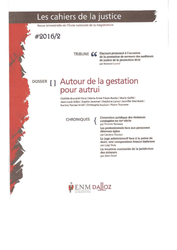
Référence complète : Frison-Roche, M.-A., Face au fait des maternités de substitution, que peut faire le juge ?, in Dossier "Autour de la gestation pour autrui", Les cahiers de la justice, Revue trimestrielle de l'École nationale de la magistrature, ENM/Dalloz, 2016.
La GPA, ou maternité de substitution, est une pratique qui conduit à s'interroger sur la normativité juridique à travers la relation entre le droit et le fait, que celui-ci soit technologique, sociétal, économique ou géographique.
Face aux litiges qui lui sont soumis, le juge français doit rendre une décision en application des règles de droit en vigueur, y compris européennes.
La question ici posée est de savoir si, au regard de ses pouvoirs et de son office, le juge peut et doit dégager des solutions techniques plus fines et s'il peut et doit répondre par principe.
Jan. 14, 2015
Blog
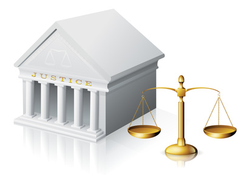
Oublions un instant l'objet même de l'arrêt AZF et limitons la lecture à la question procédurale tranchée par l'arrêt rendu par la chambre criminelle de la Cour de cassation le 13 janvier 2015.
Celui-ci est très remarquable et mérite pleine approbation en ce qu'il affirme l'obligation des juges de respecter l'impartialité de l'institution juridictionnelle, mise à mal si les personnes qui ont à faire à elle peuvent établir un "doute objectif" concernant l'impartialité d'un juge.
A travers cette affirmation, c'est un jeu de présomptions, la principale étant la présomption de l'impartialité du juge, que la Cour de cassation établit, mettant en juste mesure les charges et les objets de preuve en la matière.
Lire ci-dessous un commentaire développé de l'arrêt.
Oct. 27, 2014
Blog
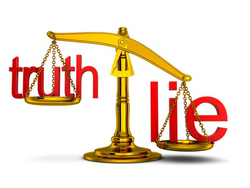
La doctrine a applaudi lorsque la Cour de cassation, par un arrêt d'assemblée plénière du 27 février 2009, a accueilli en France le principe de l'estoppel.
Ce principe, jusqu'alors propre au droit de Common Law, interdit à une personne de se contredire non seulement dans une procédure, mais encore entre plusieurs procédures. Cela constitue une forme plus rationnelle et plus avancée du principe de loyauté processuelle.
Pourtant, n'appelle-t-on pas l'avocat "le menteur" ? La personne poursuivie dans un procès pénal n'a-t-elle pas le droit fondamental de mentir ? Dans cette joute qu'est le procès, tous les moyens ne sont-ils pas bons ? Quelle feuille de papier sépare la contradiction, le mensonge, la manoeuvre, le silence, l'éloquence, la rhétorique, la présentation ingénieuse, le débat, le contradictoire, le procès lui-même ?
L'arrêt que vient de rendre la Première chambre civile, le 24 septembre 2014, est de grande qualité, car il vient, certes d'une façon un peu elliptique, rappelé que l'estoppel joue entre les parties, et non pas entre la partie et le juge.
Il éclaire aussi sur l'office de la Cour de cassation, lui-même : le juge de cassation entre de plus en plus dans l'appréciation des faits. Ici, la Cour, "juge du droit", pose que les juges du fond ne pouvaient pas s'être trompés sur ce que voulait réellement le plaideur. Nous sommes dans une appréciation directe du cas. Pourquoi pas. Mais alors, il faudrait une motivation plus étayée. N'est-ce pas ce que vient d'expliquer le Premier Président ?
Updated: July 31, 2013 (Initial publication: Oct. 17, 2011)
Teachings : Les Grandes Questions du Droit, semestre d'automne 2011

Sept. 15, 2010
Publications
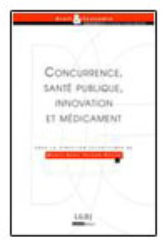
Référence complète : FRISON-ROCHE, Marie-Anne, L'office du juge en matière de médicaments, in FRISON-ROCHE, Marie-Anne (Dir.), Concurrence, santé publique, innovation et médicament, coll. Droit et Economie, LGDJ, Paris, 2010, p.423-432.
Lire la présentation générale de l'ouvrage dans lequel l'article a été publié.
April 15, 2010
Thesaurus : Doctrine
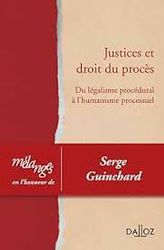
► Référence complète : H. Croze, "Le juge doit-il dire le droit ?", in Mélanges en l'honneur de Serges Guinchard, Justice et droit du procès. Du légalisme procédurale à l'humanisme processuel, , 2010, pp.225-232.
____
🦉Cet article est accessible en texte intégrale pour les personnes qui suivent les enseignements du professeure Marie-Anne Frison-Roche.
April 2, 2008
Hearings by a Committee or Public organisation
► Référence complète : M.-A. Frison-Roche, audition par la Commission Magendie sur La voie d'appel, 2 avril 2008
________